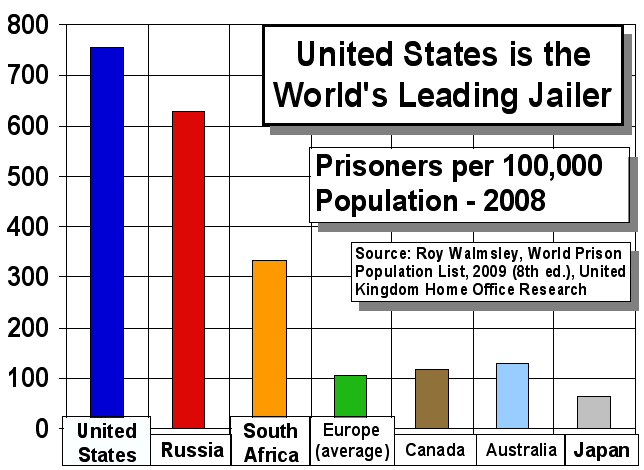Roughly one out of 135 Americans is in jail. With about one 20th of the world's population, the United States holds on quarter of the world's population of prisoners. Imprisonment of America's 2.3 million prisoners, costing $24,000 per inmate per year, and $5.1 billion in new prison construction, consumes $60.3 billion in budget expenditures.
This article is largely drawn from a single Wikipedia entry. The information is readily available.
Midyear 2009 incarceration rates for inmates held in custody in prisons or jails differed by race and gender. Black males, with an incarceration rate of 4,749 inmates per 100,000 U.S. residents, were incarcerated at a rate more than six times higher than white males (708 inmates per 100,000 U.S. residents) and 2.6 times higher than Hispanic males (1,822 inmates per 100,000 U.S. residents). Black females (with an incarceration rate of 333 per 100,000) were more than two times as likely as Hispanic females (142 per 100,000) and over 3.6 times more likely than white females (91 per 100,000) to have been in prison or jail on June 30, 2009.
Source: Bureau of Justice Statistics
Within three years of being released, 67% of ex-prisoners re-offend and 52% are re-incarcerated, according to a study published in 1994.[73] The rate of recidivism is so high in the United States that most inmates who enter the system are likely to reenter within a year of their release.So What Do the Figures Mean?
My guess is that blacks are so much more likely to wind up in jail than are Hispanics who in turn are more likely to be jailed than whites is due to the pervasive prejudice in U.S. society. Blacks and Hispanics are more likely to be in the underclass with less economic opportunity than whites. They are more likely to be surrounded by and involved in drug culture. Their families are more likely to be stressed. Those conditions probably make them more likely to commit crimes. They are more likely to be targeted by police. They are more likely to be convicted if arrested. Once they have prison records, they are very likely to return to prison.
Unfortunately there are economic realities that reinforce the problem. Police forces have grown as has the number of prisons and prison guards. Towns are now dependent on the prisons that they house. There is an industry providing supplies to the police and prisons that would lobby for its industrial health and survival. A whole generation has been ruined by their prison experience, and their families have suffered as well.
Our prison population was not always so large. Richard Nixon discovered that he could gain votes by declaring a "war on drugs" and Ronald Reagan mined American fear for further political gains. Politicians have continued to enact Draconian laws against drug use, drug dealing, and crime. The "three strikes and your out" legislation has been especially dysfunctional. And the voters bear the ultimate responsibility for letting them get away with it.
We could start a reform by recognizing drug dependency as a medical problem. We could shorten sentences and help former prisoners to reenter society on release. We could revise and reduce sentences and incarcerate people in ways that would reduce recidivism. And we could make racial and ethnic prejudice less pervasive!


No comments:
Post a Comment